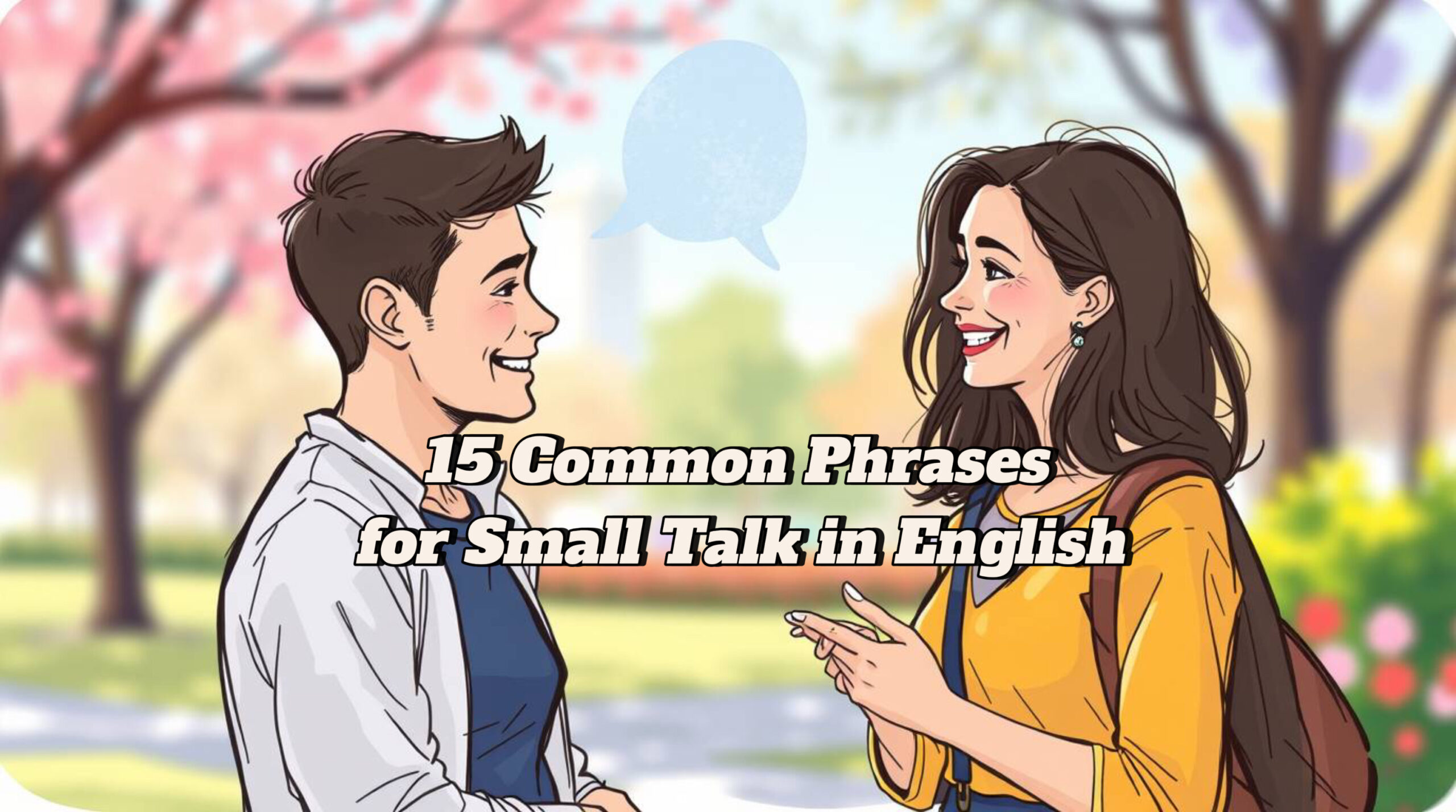Introduction
Small talk is an essential part of everyday communication, especially in English-speaking cultures. It helps break the ice, build relationships, and make social interactions more comfortable. For English learners at the A1 level, mastering small talk phrases can boost confidence and make conversations easier. In this guide, we’ll explore 15 common phrases for small talk, explain their meanings, and provide examples to help you use them naturally. By the end of this post, you’ll feel ready to engage in casual conversations with ease.

What Is Small Talk?
Small talk refers to light, informal conversations about everyday topics like the weather, hobbies, or current events. It’s often used to start a conversation or fill gaps during social interactions. While it may seem simple, small talk plays a big role in building connections and making people feel comfortable.
For beginners, small talk is a great way to practice English without feeling overwhelmed. The phrases we’ll cover are easy to remember and perfect for A1 learners.
Why Is Small Talk Important?
- Breaks the Ice: Helps you start conversations with strangers or acquaintances.
- Builds Relationships: Creates a friendly atmosphere and opens doors for deeper discussions.
- Improves Confidence: Practicing small talk helps you become more comfortable speaking English.
- Cultural Norm: In many English-speaking countries, small talk is a key part of social etiquette.
Now, let’s dive into the 15 common phrases for small talk!
1. “Hi, how are you?”
This is one of the most basic greetings in English. It’s polite and friendly, making it ideal for starting a conversation.
Meaning: A way to ask someone how they’re feeling or doing.
– Example:
– Person A: “Hi, how are you?”
– Person B: “I’m good, thanks! How about you?”
Tip: Always respond positively, even if you’re not feeling great. For example, say “I’m okay” instead of “I’m terrible.”
2. “Nice to meet you.”
Use this phrase when meeting someone for the first time. It shows politeness and respect.
– Meaning: Expresses pleasure at meeting someone new.
– Example:
– Person A: “Hi, I’m John.”
– Person B: “Nice to meet you, John. I’m Mary.”
Tip: Pair this phrase with a smile and a handshake (if appropriate).
3. “How’s it going?”
This is a casual way to ask how someone is doing. It’s less formal than “How are you?”
– Meaning: A relaxed greeting that asks about someone’s general well-being.
– Example:
– Person A: “Hey, how’s it going?”
– Person B: “Not bad, thanks. How about you?”
Tip: You can respond with “Good,” “Not bad,” or “Could be better.”
4. “What’s up?”
A very informal greeting, often used among friends or peers.
– Meaning: Asks what’s happening or what someone is doing.
– Example:
– Person A: “Hey, what’s up?”
– Person B: “Nothing much, just relaxing. What about you?”
Tip: This phrase is best used in casual settings, not formal ones.
5. “How was your weekend?”
This question is perfect for Monday mornings or any time you want to show interest in someone’s life.
– Meaning: Asks about someone’s activities during the weekend.
– Example:
– Person A: “Hi, how was your weekend?”
– Person B: “It was great! I went hiking. What did you do?”
Tip: Be prepared to share your own weekend story after asking.
6. “Did you watch [TV show/movie]?”
This phrase is a great way to find common interests.
– Meaning: Asks if someone has seen a specific TV show or movie.
– Example:
– Person A: “Did you watch the new Marvel movie?”
– Person B: “Yes, I loved it! What did you think?”
Tip: Choose popular shows or movies that most people know about.
7. “Have you been to [place]?”
Use this phrase to talk about travel or places you’ve visited.
– Meaning: Asks if someone has ever visited a particular location.
– Example:
– Person A: “Have you been to New York?”
– Person B: “Yes, I went there last year. It was amazing!”
Tip: Share your own experience with the place to keep the conversation going.
8. “What do you do?”
This is a polite way to ask about someone’s job or occupation.
– Meaning: Asks about someone’s profession or daily activities.
– Example:
– Person A: “So, what do you do?”
– Person B: “I’m a teacher. How about you?”
Tip: Avoid asking this question too early in the conversation—it might feel intrusive.
9. “Where are you from?”
A classic small talk question that helps you learn more about someone’s background.
– Meaning: Asks about someone’s hometown or country of origin.
– Example:
– Person A: “Where are you from?”
– Person B: “I’m from Canada. How about you?”
Tip: Follow up with questions like “What’s it like there?” to keep the conversation flowing.
10. “Do you have any hobbies?”
This phrase is a great way to discover shared interests.
– Meaning: Asks about someone’s favorite activities or pastimes.
– Example:
– Person A: “Do you have any hobbies?”
– Person B: “Yes, I love painting and reading. What about you?”
Tip: Mention your own hobbies to encourage the other person to share theirs.
11. “The weather’s nice today, isn’t it?”
Talking about the weather is a universal small talk topic.
– Meaning: Comments on the current weather and invites agreement.
– Example:
– Person A: “The weather’s nice today, isn’t it?”
– Person B: “Yes, it’s perfect for a walk!”
Tip: Use this phrase when you’re unsure what else to say—it’s always relevant.
12. “Are you enjoying [event/activity]?”
This phrase works well at parties, conferences, or group activities.
– Meaning: Asks if someone is having a good time.
– Example:
– Person A: “Are you enjoying the party?”
– Person B: “Yes, it’s been fun so far!”
Tip: Tailor the question to the specific event or activity.
13. “How long have you lived here?”
Use this phrase to learn more about someone’s connection to a place.
Meaning: Asks how long someone has resided in a particular location.
– Example:
– Person A: “How long have you lived here?”
– Person B: “About five years. What about you?”
Tip: Share your own experience living in the area to continue the conversation.
14. “Do you like [food/drink]?”
Food and drinks are always safe topics for small talk.
Meaning: Asks if someone enjoys a specific type of cuisine or beverage.
– Example:
– Person A: “Do you like coffee?”
– Person B: “Yes, I drink it every morning!”
Tip: Suggest trying a new dish or drink together if the opportunity arises.
15. “See you later!”
This phrase is a friendly way to end a conversation.
Meaning: Indicates that you’ll meet again soon.
– Example:
– Person A: “See you later!”
– Person B: “Take care!”
Tip: Use variations like “Catch you later!” or “Talk soon!” for variety.

Tips for Successful Small Talk
- Listen Actively: Pay attention to what the other person says and respond accordingly.
- Ask Follow-Up Questions: Show genuine interest by asking related questions.
- Keep It Positive: Focus on upbeat topics and avoid controversial subjects.
- Practice Regularly: The more you practice, the more natural small talk will feel.
Conclusion
Small talk doesn’t have to be intimidating. With these 15 common phrases, you’ll be able to start and maintain conversations confidently. Remember, the key to successful small talk is being polite, curious, and open-minded. Practice these phrases in real-life situations, and soon you’ll notice improvements in your English communication skills.
Now that you’ve learned these phrases, why not try them out today? Strike up a conversation with a friend, colleague, or even a stranger—you might be surprised at how rewarding it feels!




